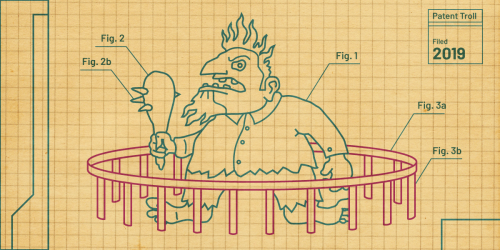Recent reports from Congress suggest that patent reform might be taken off the table for the summer. This bad news arrives at the same time as a new study showing that patent trolls are more active than ever before. Opponents of reform are trying derail efforts to tackle trolls by insisting that any legislation must include unnecessary changes to procedures for challenging patents the the Patent Office. We urge Congress to remain focused on the real problem of patent litigation abuse.
Much of the recent debate has focused on post-grant procedures at the Patent Office. Earlier this year, EFF used one of these procedures to successfully challenge key claims from the infamous podcasting patent. We brought our challenge using a relatively new procedure called inter partes review or IPR. Opponents of patent reform are insisting that any legislating include changes reducing access to IPRs and making them less effective as a way to invalidate bad patents. Some have suggested this is the pharmaceutical industry’s poison pill strategy for defeating patent reform.
It’s frustrating that the poison pill tactic has been somewhat effective. There is no crisis with post-grant review procedures like IPRs. A single hedge fund (acting in partnership with infamous patent troll Erich Spangenberg) filed some IPRs, which people accused of being part of an apparent strategy to manipulate stock prices. It doesn’t appear that this worked especially well for the hedge fund and there is no indication that it will become a significant problem. Meanwhile, the high technology industry is being inundated with thousands and thousands of patent troll lawsuits. Patent troll litigation has been rampant for years and is only getting worse. Rather than give in to the pharmaceutical industry’s scaremongering about an isolated event, Congress should tackle the severe problem that it has been considering for over a year.
Other criticisms of the bills before Congress fall apart on close inspection. We have published another blog post today countering some of the misinformation that opponents are spreading about the Innovation Act. We’ve been here before. Back in April 2014, the Senate seemed very close to a deal when Harry Reid pulled the plug. Patents returned to the agenda this year and encouraging bills passed both the Senate Judiciary Committee and the House Judiciary Committee. It’s important not to give up on the campaign for legislative patent reform. Legislation is hard and can take multiple attempts. The America Invents Act took almost five years to make its way through Congress.
Contact your representative and tell them to pass the Innovation Act. The proposed legislation won’t hurt small businesses or legitimate patent owners. Rather, it is targeted at the worst actors and will cut back on rampant abusive litigation from patent trolls.







